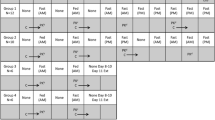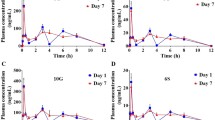Abstract
Background: We wished to define the maximum tolerated dose (MTD), toxicity, and pharmacokinetics of the novel isoflav-3-ene, NV06 (Phenoxodiol™), a compound with a diphenolic structure related chemically and biologically to genistein and flavopiridol. Patients and Methods: Twenty-one patients with advanced cancers were treated with weekly intravenous administration of NV06 at escalating dose levels with 1–4 patients at each dose cohort. Plasma sampling was undertaken to characterize the pharmacokinetic (PK) profile of the compound. Results: Toxicity was minimal, with asymptomatic Grade 3 lymphocytopenia occurring in nine patients. Nine patients developed Grade 1 nausea, six patients developed Grade 1 increases in alkaline phosphatase, and six patients developed Grade 1 increases in transaminases. Two patients experienced hypersensitivity reactions. The MTD was not reached. Most patients had progressive disease on treatment but eight completed 12 weeks and two completed 24 weeks of treatment. The best response was stable disease of 6 months duration. The plasma half-life (T1/2), clearance (Cl), and volume of distribution (V D) were 304 (±91) min, 82 (±19) ml/min and 32,663 (±7,199) ml, respectively, for total NV06. Conclusions: NV06 is well tolerated and can be given safely as an intravenous infusion over 1–2 h at a dose of at least 30 mg/kg.


Similar content being viewed by others
References
Aguero MF, Facchinetti MM, Shelg Z, Senderowicz AM (2005) Phenoxodiol, a novel isoflavone, induces G1 arrest by specific loss in cyclin—dependent kinase 2 activity by p53-independent induction of p21WAF1/CIP1. Cancer Res 65:3364–3373
Carpenter TO, Gerloczy A, Pitha J (1995) Safety of parenteral hydroxypropyl beta-cyclodextrin. J Pharm Sci 84:222–225
Carraway H, Hidalgo M (2004) New targets for therapy in breast cancer: mammalian target of rapamycin (mTOR) antagonists. Breast Cancer Res 6:219–224
Constantinou AI, Husband A (2002) Phenoxodiol (2H-1-benzopyran-7-0,1,3-(4-hydroxyphenyl)), a novel isoflavone derivative, inhibits DNA topoisomerase II by stabilizing the cleavable complex. Anticancer Res 22:2581–2585
Irie T, Fukunaga K, Garwood MK, Carpenter TO, Pitha J (1992) Hydroxypropylcyclodextrins in parenteral use. II: effects on transport and disposition of lipids in rabbit and humans. J Pharm Sci 81:524–528
Kamsteeg M, Rutherford T, Sapi E, Hanczaruk B, Shahabi S, Flick M, Brown D, Mor G (2003) Phenoxodiol—an isoflavone analog—induces apoptosis in chemoresistant ovarian cancer cells. Oncogene 22:2611–2620
Kouroukis CT, Belch A, Crump M, Eisenhauer E, Gascoyne RD, Meyer R, Lohmann R, Lopez P, Powers J, Turner R, Connors JM, National Cancer Institute of Canada Clinical Trials Group (2003) Flavopiridol in untreated or relapsed mantle-cell lymphoma: results of a phase II study of the National Cancer Institute of Canada Clinical Trials Group. J Clin Oncol 21:1740–1745
McPherson R, Johnson L, de Souza P (2002) Preclinical activity of NV06, a novel isoflav-3-ene, in prostate cancer cell lines. Presented at Australian Institute for Medical Research Annual Conference, Melbourne, 25–29 November (abstr)
Phenoxodiol (NV06) Investigator’s Brochure. Novogen Pty Ltd
Sapi E, Alvero AB, Chen W, O’Malley D, Hao XY, Dwipoyono B, Garg M, Kamsteeg M, Rutherford T, Mor G (2004) Resistance of ovarian carcinoma cells to docetaxel is XIAP dependent and reversible by phenoxodiol. Oncol Res 14:567–578
Schwartz GK, Ilson D, Saltz L, O’Reilly E, Tong W, Maslak P, Werner J, Perkins P, Stoltz M, Kelsen D (2001) Phase II study of the cyclin-dependent kinase inhibitor flavopiridol administered to patients with advanced gastric carcinoma. J Clin Oncol 19:1985–1992
Schwartz GK, O’Reilly E, Ilson D, Saltz L, Sharma S, Tong W, Maslak P, Stoltz M, Eden L, Perkins P, Endres S, Barazzoul J, Spriggs D, Kelsen D (2002) Phase I study of the cyclin-dependent kinase inhibitor flavopiridol in combination with paclitaxel in patients with advanced solid tumors. J Clin Oncol 20:2157–2170
Senderowicz AM, Headlee D, Stinson SF, Lush RM, Kalil N, Villalba L, Hill K, Steinberg SM, Figg WD, Tompkins A, Arbuck SG, Sausville EA (1998) Phase I trial of continuous infusion flavopiridol, a novel cyclin-dependent kinase inhibitor, in patients with refractory neoplasms. J Clin Oncol 16:2986–2999
Shapiro GI, Supko JG, Patterson A, Lynch C, Lucca J, Zacarola PF, Muzikansky A, Wright JJ, Lynch TJ Jr, Rollins BJ (2001) A phase II trial of the cyclin-dependent kinase inhibitor flavopiridol in patients with previously untreated stage IV non-small cell lung cancer. Clin Cancer Res 7:1590–1599
Stadler WM, Vogelzang NJ, Amato R, Sosman J, Taber D, Liebowitz D, Vokes EE (2000) Flavopiridol, a novel cyclin-dependent kinase inhibitor, in metastatic renal cancer: a University of Chicago Phase II Consortium study. J Clin Oncol 18:371–375
Tan AR, Headlee D, Messmann R, Sausville EA, Arbuck SG, Murgo AJ, Melillo G, Zhai S, Figg WD, Swain SM, Senderowicz AM (2002) Phase I clinical and pharmacokinetic study of flavopiridol administered as a daily 1-hour infusion in patients with advanced neoplasms. J Clin Oncol 20:4074–4082
Thomas JP, Tutsch KD, Cleary JF, Bailey HH, Arzoomanian R, Alberti D, Simon K, Feierabend C, Binger K, Marnocha R, Dresen A, Wilding G (2002) Phase I clinical and pharmacokinetic trial of the cyclin-dependent kinase inhibitor flavopiridol. Cancer Chemother Pharmacol 50:465–472
Thompson JE, Thompson CB (2004) Putting the rap on Akt. J Clin Oncol 22:4217–4226
Wilkinson E (2004) Phenoxodiol offers hope for ovarian cancer. Lancet Oncol 5:201
Acknowledgements
The study was funded in part by Novogen Pty Ltd, Australia. The authors would like to thank the patients who participated in the study, and the nursing staff for their care. Thanks also to Quintiles Pty Ltd (Australia) for data management.
Author information
Authors and Affiliations
Corresponding author
Rights and permissions
About this article
Cite this article
de Souza, P.L., Liauw, W., Links, M. et al. Phase I and pharmacokinetic study of weekly NV06 (Phenoxodiol™), a novel isoflav-3-ene, in patients with advanced cancer. Cancer Chemother Pharmacol 58, 427–433 (2006). https://doi.org/10.1007/s00280-006-0189-6
Received:
Accepted:
Published:
Issue Date:
DOI: https://doi.org/10.1007/s00280-006-0189-6




